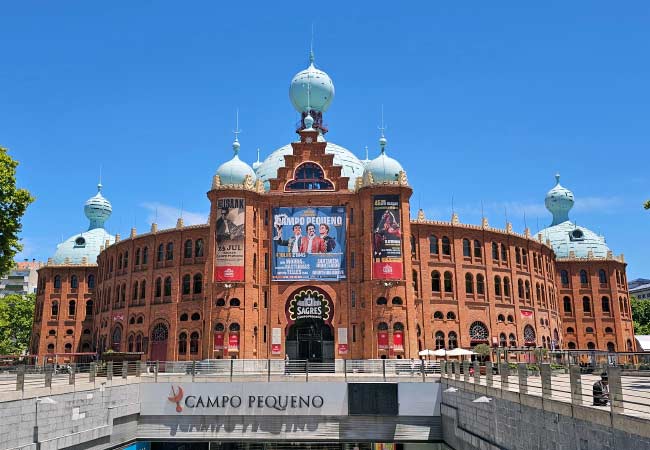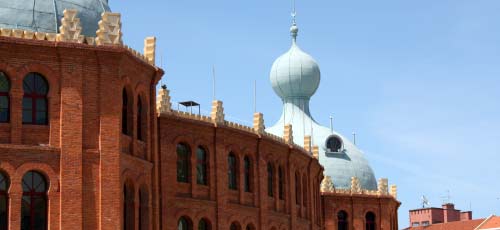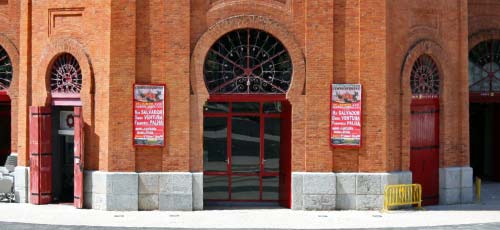LisbonLisboaPortugal.com
The best independent guide to Lisbon
LisbonLisboaPortugal.com
The best independent guide to Lisbon
Campo Pequeno, Lisbon Bullring
Campo Pequeno stands as one of Lisbon's most distinctive landmarks, a grand orange-brick bullring crowned with decorative onion-shaped domes that has graced the city since 1892.
The Campo Pequeno stadium is the official home of Portuguese bullfighting and during the summer season visitors are able to watch the spectacle of Portuguese bullfighting. Located on Avenida da República in the Avenidas Novas district, this architectural gem has evolved far beyond its original purpose to become a vibrant entertainment and shopping destination.

The Campo Pequeno in Lisbon
Designed by Portuguese architect António José Dias da Silva, Campo Pequeno showcases a unique blend of Moorish-inspired details influenced by Spanish and North African architecture. The imposing structure features four octagonal towers topped with distinctive domes and twin turrets forming the main entrance. The elaborate orange-brick facade creates something truly unique in Lisbon's urban landscape, making it worth visiting even for those uninterested in bullfighting.
Beneath the historic arena lies a modern shopping centre spanning 7,000 square metres. The underground complex houses 60 shops, 20 restaurants, 8 movie theatres, a Continente supermarket, and parking for 1,250 cars. Open daily from 10am to 11pm, it provides a convenient escape from Lisbon's summer heat or a perfect rainy-day activity.
The restaurant selection ranges from traditional Portuguese establishments like Portugália and Baía do Peixe to international chains and a bustling food court. For a more atmospheric dining experience, try the ground-level restaurants that encircle the building's perimeter.

Lisbon bullring
Portuguese Bullfighting Tradition
Portuguese bullfighting, known as "tourada," represents a centuries-old tradition that differs significantly from its Spanish counterpart. Most importantly, the bull is not killed in front of the audience-a practice dating back to the 18th century when Portuguese royalty banned public killing of bulls.
A traditional Portuguese bullfight features three main components:
Cavaleiros - Horsemen and horsewomen in elaborate 17th-century costumes perform on specially-trained Lusitano horses. They demonstrate extraordinary skill while placing decorated spears (bandarilhas) in the bull's shoulders, showcasing remarkable coordination between horse and rider just inches from a charging bull.
Forcados - Eight men face the bull without protection. The leader provokes the bull to charge, then attempts to grab its head while teammates help subdue the animal. This "pega de cara" (face catch) represents the event's most dramatic moment.
The Conclusion - Trained steers lead the bull back to its pen alive, though what happens afterward remains controversial and varies by venue.
Attending a Bullfight
Bullfights run from Easter through September, traditionally on Thursday evenings starting around 10pm (times may vary). The arena accommodates nearly 7,000 spectators for bullfights, with tickets ranging from €15-€50 depending on seating location. Purchase tickets at the box office, online at ticketline.pt, or on event nights.
Year-Round Entertainment Venue
Outside bullfighting season, Campo Pequeno transforms into one of Lisbon's premier entertainment venues, accommodating up to 10,000 people for concerts and shows. Recent years have featured international musicals like Cats and Mamma Mia, stand-up comedy, sporting events including basketball and beach rugby, and major concert tours.
The venue's central location, excellent transport links, and flexibility make it popular for corporate events, trade shows, and conferences. A major renovation between 2000-2006 added a retractable roof, enabling year-round events regardless of weather.

The Bullfighting Museum
For those interested in cultural history without attending live events, Campo Pequeno houses a small museum dedicated to Portuguese bullfighting traditions. Reopened in 2015 with an expanded collection, it displays costumes, equipment, posters, photographs, and a short video about bullfighting history, including donations from prominent figures in Portuguese bullfighting.
The Surrounding Area
Don't miss Jardim Marquês de Marialva, a 9,800-square-metre garden surrounding Campo Pequeno. Recently converted to a pedestrian-only zone, this pleasant green space provides respite in the busy neighbourhood and serves as a popular gathering spot for evening strolls and pre-event socializing. The building's name reflects Lisbon's straightforward urban planning approach-Campo Pequeno means "Small Field," contrasting with Campo Grande ("Large Field") further north along Avenida da República.
Discover more of Lisbon with our most popular guides
If you've found our content valuable, we'd welcome your support.
The digital publishing landscape has evolved significantly. As a small independent publisher, we face growing challenges. Search engines increasingly favour paid content over organic results, while AI-generated content often reproduces original work without attribution.
To support our work, please consider bookmarking this page (press Ctrl + D) for quick access. If you find an article helpful, we'd be grateful if you'd share it with friends on social media.
For specific questions, please see our Reddit community at r/LisbonPortugalTravel.
Should you notice any outdated or incorrect information, please contact us at [email protected]
Thank you for helping us continue to provide valuable content in an increasingly challenging digital environment.
A complete list of all of our Lisbon articles
If you've found our content valuable, we'd welcome your support.
The digital publishing landscape has evolved significantly. As a small independent publisher, we face growing challenges. Search engines increasingly favour paid content over organic results, while AI-generated content often reproduces original work without attribution.
To support our work, please consider bookmarking this page (press Ctrl + D) for quick access. If you find an article helpful, we'd be grateful if you'd share it with friends on social media.
For specific questions, please see our Reddit community at r/LisbonPortugalTravel.
Should you notice any outdated or incorrect information, please contact us at [email protected]
Thank you for helping us continue to provide valuable content in an increasingly challenging digital environment.































